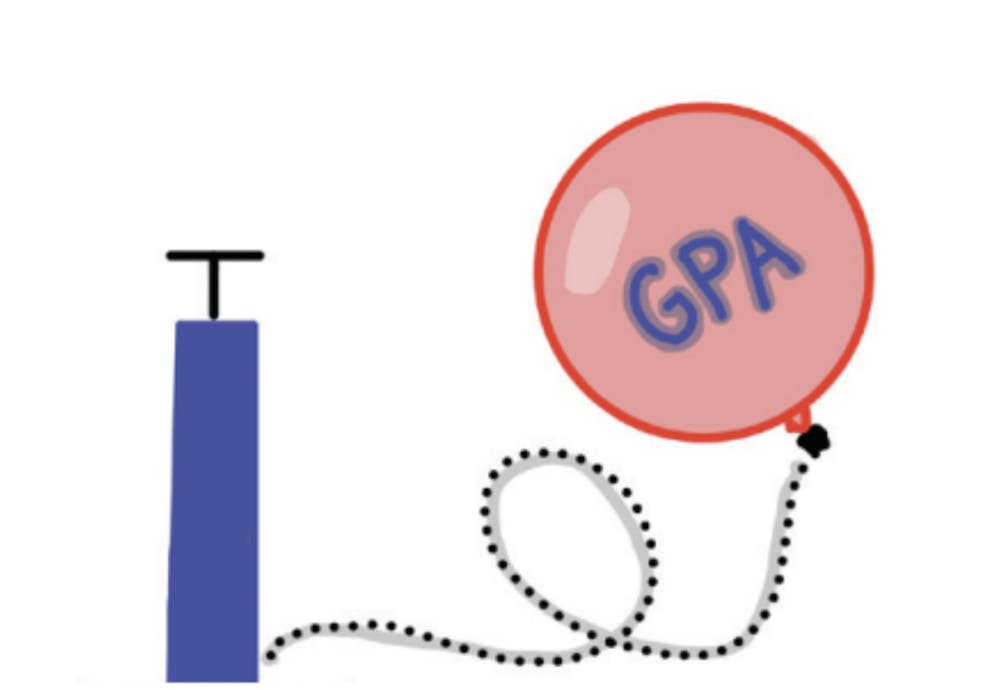For better or for worse, grades are at the center of higher education. Middlebury’s selective admissions process demands that applicants show rigorous academic achievements on high school transcripts; Latin and departmental honors at college graduation have GPA thresholds; graduate institutions look upon student grades as an indicator of skill level; and employers, especially within the fields of consulting and finance, might only seek to interview students with the highest GPAs.
Grades are used ubiquitously to assess student performance, but what do they say about the institution?
The last time the college officially set out to assess its grading practices was in 2005 with the Educational Affairs Committee’s Ad Hoc Committee on Grading.
The report defined grade inflation as a breakdown in the evaluation system in which grades are increasing more rapidly than the quality of the work being graded. Data published in the report indicated a steady rise in the grades of Middlebury students from an average GPA just above 3.0 in 1987 to about 3.35 in 2005.
Further data from a September 2023 faculty meeting showed the average GPA rising up to 3.65 in spring 2023, as well as a spike to 3.88 on average in spring 2020, likely due to the Covid-19 pandemic, and the fluctuating virtual methods of instruction and examination that came with it.
The data points to grades steadily rising, and the report aimed to investigate any confounding variables that could possibly account for this change.
“This might, on the surface, seem to be a confirmation that grade inflation is occurring: the average grade has increased by approximately 10% over a 15 year period… However, a closer examination indicates that grade inflation, as defined previously, is but one of several competing explanations that might explain this pattern,” the 2005 report wrote.
The college becoming more selective over the years, and an increasing number of incoming students in the top 10% of their high school class, along with varying class sizes and methods of assessment across departments are all potential explanations for grade inflation, according to the 2005 report.
“We were unable to conclude… whether grades have risen in an inflationary fashion,” it explained.
As sentiments on campus about grading practices and intellectual rigor have grown in recent years, understanding the nature of rising grades at Middlebury requires looking at how and why grades are assigned.
The report outlined several possible interpretations of what grades can be used for: a mechanism to rank students in the class; an indicator of a student’s mastery of the course materials; an incentive; and as feedback to modify instructional methods.
Rick Bunt, associate dean of the sciences and professor of chemistry, spoke with The Campus to provide an administrative and faculty perspective on grading practices. Bunt, who has been a faculty member at Middlebury since 1998, described his experience teaching organic chemistry, a historically demanding course, and a requirement for medical school applications.
“Early on in my career if someone got a B+ in organic chemistry, they were super excited… now most students consider a B+ to be a poor grade,” Bunt explained.
He noted that the expectations have changed, independent of performance, and lower marks are now considered punitive. “Grades are getting higher; I don’t think every single student who comes out of chemistry classes has necessarily mastered the material at an expert level anymore… that’s kind of grade inflation,” Bunt said.
Gage Schrier ’24.5, a creative writing and political science major, lamented the trend of rising grades.
“Uniform grading not only robs us of an opportunity to assess our educational progress, but creates strong incentives to stay away from classes where you could risk something less than an A,” Schrier told The Campus.
These trends of grade inflation are not unique to Middlebury.
A December 2023 op-ed in The Wall Street Journal titled “Grade Inflation Makes A The New C” cataloged several students’ opinions on rising grades at institutions across the country. Some students sought to return to an environment where rigorous grading is used to rank students, while others spoke of detaching student performance from grades entirely, in order to facilitate a more earnest learning experience. This national trend raises questions for people about the meaning of student assessments.
Professors cannot grade in a vacuum, and there are naturally other variables that can also account for rising grades. The 2005 report illustrated that the caliber of students matriculating into the school has increased, and Bunt referenced the quality of teaching increasing at the college. But comparing subjects with vastly different modes of assessment is also challenging.
Julian Calder ’24, a physics and computer science double major, spoke of his experience with the varying methods of grading across departments.
“It is a largely unavoidable result of the structure and content of different courses,” Calder told The Campus. “It is sometimes frustrating to compare the GPAs across different departments because they vary so widely.”
GPA averages amongst respondents to the 2023 Zeitgeist 5.0 survey was even higher than the official data reported by the college in September 2023. There was minimal variation across class years, and the class of 2026 had the lowest mean GPA at 3.72 while the class of 2025.5 had the highest at 3.82.
Simultaneously, however, The Campus has covered high academic stress amongst the student body. This paradox — where grades and student stress are both at an all time high — is difficult to untangle.
Calder acknowledged the various pressures present for students to achieve high grades,but said that he consciously tries to minimize such pressure and just focus on grasping the course materials to the best of his ability.
Bunt speculated that, in some ways, higher average grades may contribute to student stress.
“When grades become so much higher overall, the fear of failure becomes greater… you have to be perfect on every paper you write and every exam you take… that’s a really tough way to go through four years in my opinion,” he said.
Rising grades force students to constantly strive for an A out of fear of their GPA going down or destabilizing any postgraduation plans, which in turn leads to greater stress. Bunt suggested that normalizing a wider range of grades across disciplines could help alleviate the student stress that stems from a constant slog for perfection.
The college has tried to assist students with the inclusion of the Credit/No Credit option: students are able to test out subjects foreign to them, and not be penalized for a low grade. Bunt said he worries, however, that the Credit/No Credit option is not being used for its intended purpose.
“More often than not, I see students using it to erase lower grades,” he said.
Grading practices factor into students’ course selection decisions, sometimes leading students to enroll in courses just because of their reputation as easy As. But Schrier has the opposite approach, saying that he often avoids classes rumored to be easy As, and took a political science course by Charles A. Dana Professor of Political Science Murray Dry, because he was excited by the topical difficulty and rigorous grading that the class promised.
Calder expressed similar sentiments.
“I’ve never avoided a class because of fear of low grades because I believe that if I’m taking a course that I am passionate about and invested in, this will be reflected in the grades I receive,” he said.
Finding true grade inflation requires a test that is not feasible in an academic setting, but Bunt suggests a paradigm shift in order to diminish the stress that grades can bring for students.
“How seldom grades actually impact your life after Middlebury is something I think students should realize… after your first job, nobody really cares about your transcript ever again… I think people overestimate how long their grades will follow them along,” he explained.

Tejas Srinivasan '24 (he/him) is an Editor at Large.
Originally from Cincinnati, Ohio, Tejas previously served as an opinion editor. He spent his junior year in London at King’s College. Outside of The Campus, he also hosts a podcast called Cultural Mixtapes which he started in the summer of 2022. Tejas is an English Major, on the literature track, with a music minor.




